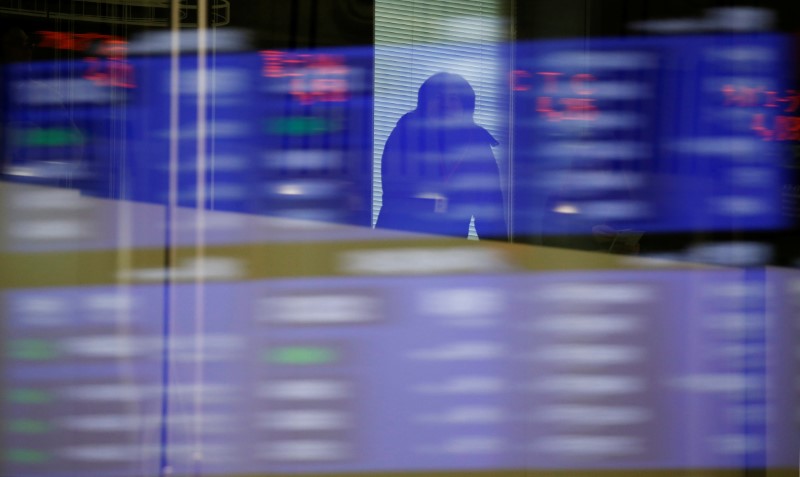 © Reuters. A visitor is seen as market prices are reflected in a glass window at the TSE in Tokyo
© Reuters. A visitor is seen as market prices are reflected in a glass window at the TSE in TokyoBy Tomo Uetake and Hideyuki Sano
TOKYO (Reuters) – Japanese Prime Minister Shinzo Abe was engulfed this week in possibly the worst political scandal in his five years in office, but Japan’s stock market was among the best performing in the world as investors were convinced he would ride out the crisis.
The Nikkei benchmark average () ended the week 1.0 percent higher. In dollar terms, Japanese shares () gained 2.3 percent this week, which, as of 0600 GMT, was second only to Taiwan.
The Nikkei has been in positive territory all week, shrugging off an admission by the finance ministry on Monday that it had altered records relating to a discounted sale of land to a school operator with ties to Abe’s wife..
Suspicions of ties to the school operator came to light more than a year ago, but many investors noted that Abe won an election after that.
“The scandal contributed to a collapse in Prime Minister Abe’s popularity in 2017,” said Alex Lee, portfolio manager at Columbia Threadneedle Investments in London. “In the end he managed to recover.”
Lee said the re-emergence of the scandal could trigger another decline in his popularity and Abe would find it difficult to continue in office if it was proved he was directly involved.
Yet many investors believe the risk of Abe’s departure is too small for them to cut their exposure to Japanese shares. Abe’s time in office has so far been unusually stable in Japan, and markets have greatly benefited from his aggressive economic stimulus, called Abenomics, and the asset price appreciation it has led to.
“We are concerned (about the scandal) but as far as Abe is staying, not a huge problem at least for equity market,” said Richard Dingemans, chief executive officer of Pelargos Capital in The Hague.
“We are paying serious attention to the approval rate but so far that of Abe’s cabinet is not falling significantly yet.”
Many investors also say there are more immediate worries, such as U.S. President Donald Trump’s tariff plans and the ongoing shake-out in the White House.
“PRETTY RELAXED”
“Clients all ask (about the Abe issue), but it is clearly nowhere near the top of their hierarchy of demons. They are pretty relaxed about the possibility of a new prime minister,” said Nicholas Smith, Japan strategist at CLSA.
“I think Japan has been incomparably better under Abe. My best guess is, his support will slip, but be back up in two months as happened last summer.”
A poll by Jiji News Agency published after the market closed on Friday showed support for Abe dropped 9.4 percentage points to 39.3 percent.
Some market players pointed out that foreign investors may not be selling now simply because they have not much left to sell after having dumping a massive 7.9 trillion yen ($75 billion) of shares, including cash and futures, for nine straight weeks since January, mirroring a decline in New York stocks.
“Global investors, who have been reducing exposure to U.S. stocks, have already increased exposure to Europe. For them, Abe is not the only political risk. There are Trump, Merkel…other risks to worry about,” said Makiko Hakozaki, senior portfolio manager at Russell Investments.
“Should they give up on Japan now even though earnings are solid? And if they have to cut exposure to Japan, where else could they put money? That’s the question they have to answer before selling Japan.”
Still, a few players say Japanese political risk may be underestimated by foreign investors, who account for 70 percent of trading activity on the Tokyo Stock Exchange.
“(Domestic) politics are something that can’t be easily digested by foreign investors. So when it comes to a market where the presence of foreign investors is substantial, pricing sometimes doesn’t match with reality,” said Shusuke Yamada, chief Japan FX and equity strategist at Bank of America Merrill Lynch (NYSE:) Japan.
“Judging from my conversations with foreign clients and the moves of the FX option market, I suspect markets haven’t yet sufficiently priced in the existing political risk,” Yamada said.
Source: Investing.com





























